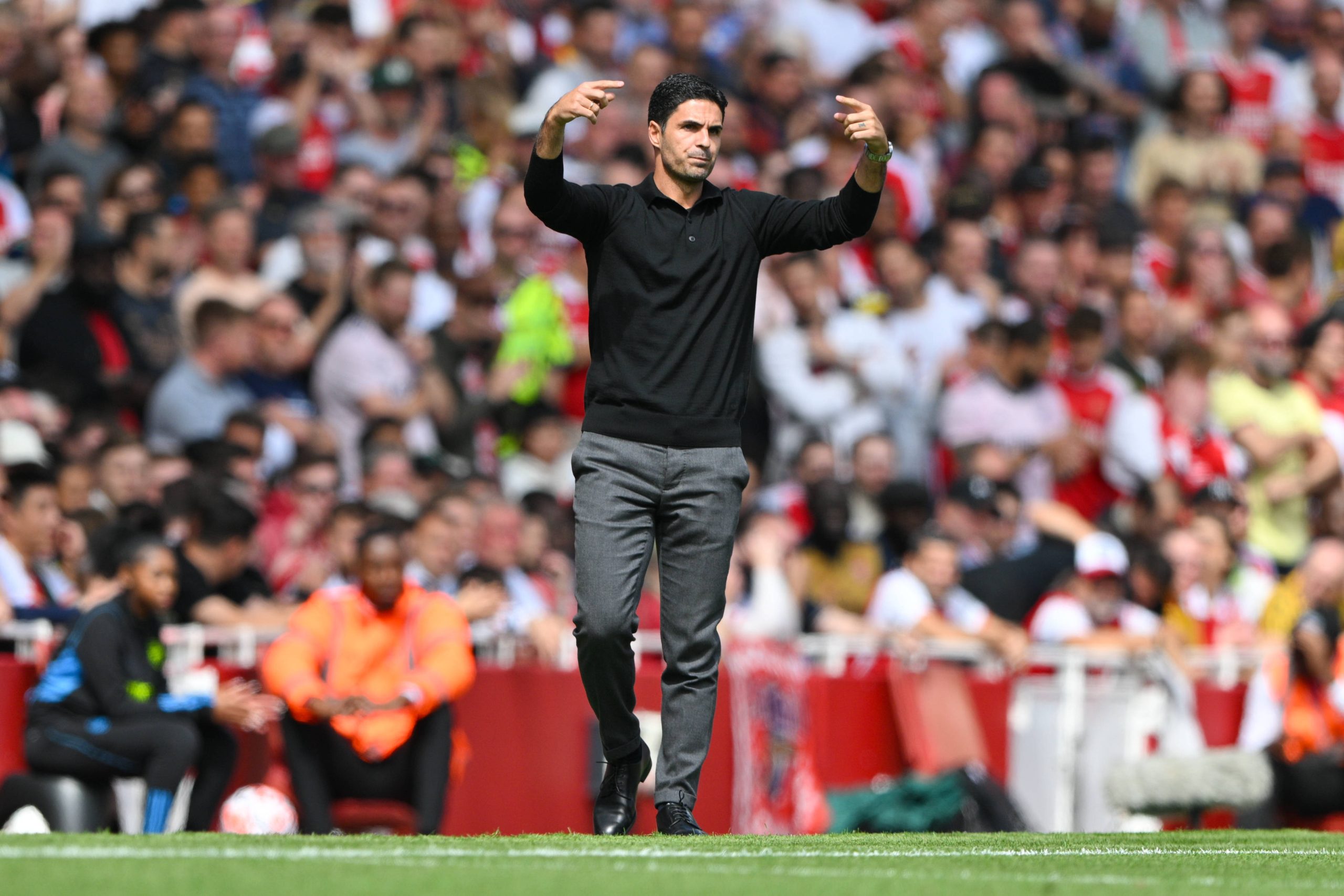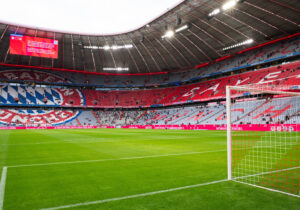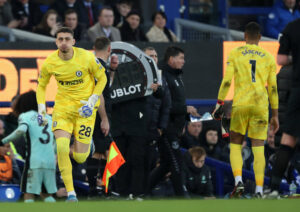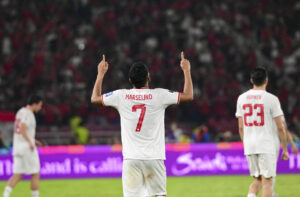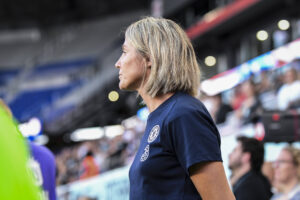The Premier League season is nearly a third of the way through, so the current international break provides the perfect opportunity to assess how teams are progressing so far. In the case of Arsenal, it is particularly appropriate to do so, because so far just one out of three, or a third, of Manager Mikel Arteta’s major changes to his team since last season can be said to be a success. Unless that ratio changes and at least one of his two other major changes starts to work out, it is highly unlikely that the Gunners will improve upon last season’s runners-up spot and win the title.
Summer Transfer Successes and Failures for Manager Mikel Arteta
The One Big Arsenal Signing Success: Declan Rice
The one big success for Arteta’s Arsenal team is of course the signing of Declan Rice. Indeed, so instantly successful has Rice been at The Emirates that it is easy to forget that he has not been there for much longer. That is because he has fitted in so seamlessly, emerging as effectively the on-field leader of the side (especially in the absence through injury of the actual captain Martin Ødegaard), that it seems as if he has been a Gunner all his life.
Given that Rice cost over £100 million to acquire from West Ham, some might say that it is hardly surprising that he has been so impressive. Nevertheless, every transfer, whatever the sum involved, is a gamble and even a massively inflated transfer fee is no guarantee of immediate success. The example of Jack Grealish, the first £100 million English player, at Manchester City proves that. In his first season at The Etihad, Grealish’s most notable contribution to the club’s success was his excessive and ultimately bleary-eyed celebration of their winning the title. It was only in his second season that he became a regular in the team.
By contrast, Rice has already made himself completely indispensable at The Emirates. Indeed, so indispensable is he that the only worry about him is what will happen when he is not in the team, through injury or suspension. The still-surprising sale of Granit Xhaka to Bayer Leverkusen and the return of Thomas Partey’s injury problems mean that Rice’s regular midfield partner has been Jorginho. However, beyond the Brazilian there is a worrying lack of depth, or even cover of any kind, in the Arsenal midfield.
The First Big Arsenal Signing Failure: Kai Havertz
Embed from Getty Images
Perhaps Arteta had hoped that Kai Havertz would become the other half of a new central midfield alongside Rice, but if so it was always a forlorn hope. The fact is that Havertz is really a forward, or at best an attacking midfielder or No.10, rather than an orthodox central midfielder. And that wasn’t just evident in the recent Carabao Cup defeat at West Ham; it was evident before Arsenal had even signed Havertz.
The joke among some Arsenal fans is that Havertz has been so disappointing so far that he will soon have to be renamed Haventertz, because whatever it is that Mikel Arteta has been looking for in him, it has not been there. First, he failed to replace Xhaka as the left-sided attacking midfielder. Then, in recent weeks, including in the home Champions League game against Sevilla, he failed to replace Ødegaard as the No.10.
The big argument in favour of signing Havertz in the first place was that he is one of the few players who could provide cover for all four attacking positions: No.10; left and right wing; and central striker, even if that would be as a withdrawn central striker, or false nine. However, he has shown little or nothing so far to suggest that he can be such a multi-faceted deputy. Leandro Trossard is better able to play in the front three positions and even Fabio Vieira, who has hardly set Arsenal alight since his arrival in the summer of 2022, has had more impact as an attacking midfielder or No.10 than Havertz has.
It is precisely because Havertz cost so much – £65 million – that he has been such a disappointment. Even in this age of rampant inflation, including in football, that kind of outlay should be enough to purchase a proven first-team player who can immediately improve the team. Havertz is not that and may ultimately become one of the most expensive squad players in the Premier League era.
The Second Big Arteta Signing Failure, Or At Least Question Mark: David Raya
Embed from Getty Images
The second big failure, or at least question mark, among Arteta’s three major changes to Arsenal since last season is the replacement of Aaron Ramsdale in goal by David Raya. And that is surely how it must be described now, rather than going along with Arteta’s always paper-thin argument that he had two No.1 goalkeepers. That always sounded unconvincing and it has been proven to be risible. Otherwise, Ramsdale would surely have replaced Raya by now, after the Spaniard’s succession of faltering performances.
Indeed, the real problem with Raya may not be with the player himself but with what he signifies, namely that Arteta is so determined to continually improve his side that he tries to fix what is not broken. Ramsdale performed outstandingly well for the majority of last season, to the point that he was genuinely challenging Jordan Pickford for the position of England goalkeeper. He was rewarded for that excellence with a new long-term contract at the end of last season, but almost before the ink had dried on it he was being replaced in the team.
Arteta, of course, has previous as a serial changer of goalkeepers. Emilio Martinez was absolutely instrumental in Arsenal winning the FA Cup within six months of Arteta taking charge; indeed, only the also-departed Pierre-Emerick Aubameyang, scorer of four goals in the semi-final and final in 2020, was more important. Nevertheless, within a few months he was gone and the same thing might be happening with Ramsdale now.
Of course teams need to continually improve, as the two best managers in the Premier League, Pep Guardiola and Jurgen Klopp, have shown over the last half a decade. Nevertheless, it is surely hugely significant that both of those great managers have settled on and stuck with an outstanding No.1 in goal, Emerson and Alisson respectively, in recognition of the unique demands and pressures placed upon a goalkeeper. By continually changing his goalkeeper in the way that he has done since he has been at The Emirates, Arteta risks undermining the team’s defence and with it the whole team.
Competition between the sticks at @Arsenal 🔴
Who are you picking: David Raya or Aaron Ramsdale? 🧤 pic.twitter.com/UB92iAXjzm
— Premier League (@premierleague) August 15, 2023
Of Course Managers Make Mistakes, But They Have To Minimise Them
All football managers make mistakes in their transfer policy, including the greatest managers, such as Arsène Wenger or Alex Ferguson; memories of such disastrous signings as Igor Stepanovs and Eric Djemba-Djemba are proof of that. The key for managers is to minimise those mistakes, to the extent that two out of every three transfers that they make can be considered a success. So far this season, only one out of Arteta’s three major changes to his side has really worked out. Somehow, either by improving or dropping the other two players concerned, he must improve that ratio, or it is unlikely that Arsenal will even match last season’s finishing position, let alone improve upon it.


